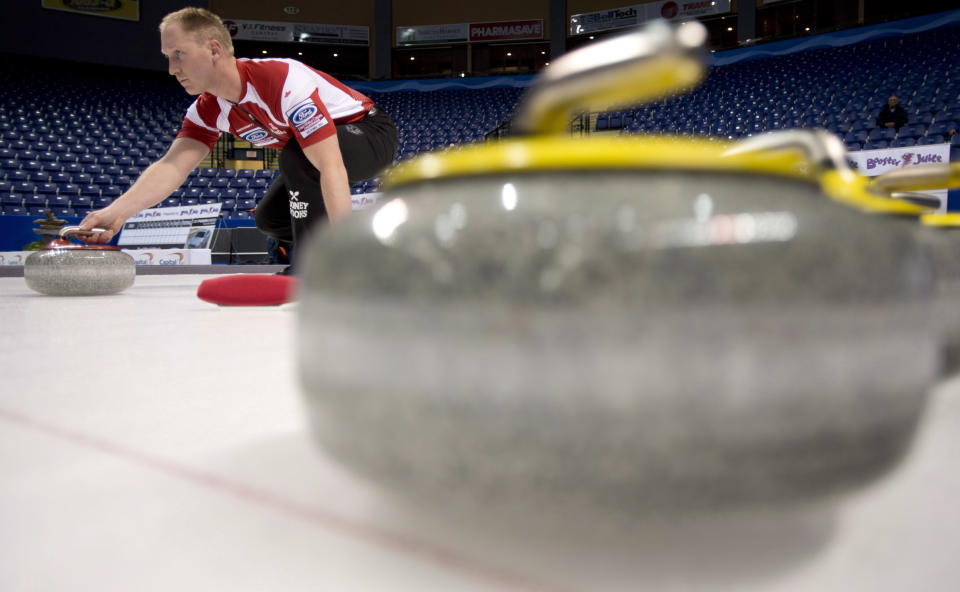World Men’s Curling Championship: Olympic shine too bright for next year’s world curling championships
VICTORIA - For the last four years gaining an Olympic berth has been the sole focus for many of the world's top curlers.
Attempting to qualify for the Sochi Games has kept some curlers in the sport. Not going to Russia could end a few careers.
The Olympics are the Super Bowl of curling. Yet, just a few weeks after all the excitement and world-wide attention the sport will receive at the Olympics, the men's and women's world championships will be held. Isn't that a little like following the Academy Awards with a festival of the top Latvian movies?
Next year's Olympics will run from Feb. 7-23. The women's world championship start March 15 in Saint John, N.B. The men's world championship begin March 29 in Beijing.
"It kind of seems a little ridiculous," said Brad Jacobs, who defeated China's Rui Liu 7-6 Saturday to give Canada its first victory at the World Men's Curling Championship.
"A lot of those teams, especially from the other countries, will be going straight from the Olympics to the worlds. It could be virtually all the same teams going from one international event to another, to beat up on each other again. It kind of does seem a little silly."
Sports like men's hockey and figure skating also crown new world champions after all the Olympic hardware has been handed out. Women's hockey plays it smart and doesn't hold a world championship in an Olympic year. Skiing, swimming and athletics hold their world championships every other year so they don't get caught in the shadows of the Olympics.
The World Curling Federation says the issue of world championships in an Olympic year was discussed at the 2010 WCF annual general assembly in Cortina, Italy. The decision was made to stay with the current format.
No doubt the money generated from sponsors and broadcasters tipped the decision.
"Running them every year gives continuity to our membership, sponsors and broadcasters," said Daniel Parker, a WCF media and communications spokesman.
Many of the curlers at this year's world championship don't have a problem with the sport trying to double dip on the international stage.
U.S. skip Brady Clark believes the Olympics creates an appetite for curling which a world championship can further nourish.
"The Olympics builds interest in the sport with the media attention it receives and could be leveraged around the world championship," he said.
Denmark's Rasmus Stjerne called the world championship "a mandatory part of the curling season." He said teams failing to qualify for the Olympics are "eager to resurrect" themselves at the world championship.
Next year's calendar creates specific problems for Canadian curlers.
The Olympic qualifying trials will be held Dec. 1-8 in Winnipeg. With Brier playdowns beginning in January, it is likely the men's team winning the Olympic berth will skip the Brier.
Things are even more onerous for the women. The Scotties Tournament of Hearts are planned for Feb. 1-9 in Montreal, overlapping the start of the Games.
It is presumed that if defending champion Rachel Homan wins the Olympic berth she will give the Scotties a pass. Instead, Manitoba's Jennifer Jones, who lost to Homan in this year's Scotties final, will become Team Canada in Montreal.
Warren Hansen, director of event operations for the Canadian Curling Association, said there's no easy solutions to the problems created when an Olympics and world championships are in the same year.
"It's never a good situation," said Hansen. "It's something you have to do.
"It would take too much steam out of the Brier and the Scotties Tournament of Hearts if the winner were not going to a world championship. It wouldn't be fair to the curlers, either."
The curling bar as been raised world wide, meaning Canada must fight for a medal whether it's at an Olympics or world championship. Holding both events in one year means Canadian curling officials must decide where they want to send their best teams.
Given the shine an Olympic gold medal casts, it's easy to understand why the world championships slip in importance every four years.

 Yahoo Sports
Yahoo Sports 


